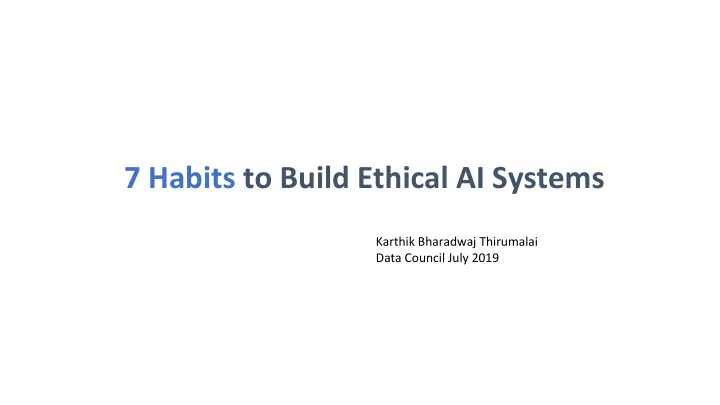

7 Habits to Build Ethical AI Systems Karthik Bharadwaj Thirumalai Data Council July 2019
Would You Trust AI?
Achievements of AI Equals Stock fish with 200K steps of training Beats Shogi Lee with 4-1 performance in 3 days of training Beats 64 Professional Go players with 21 days of training.
Achievements of AI Neural Style Transfer [1] http://openaccess.thecvf.com/content_cvpr_2016/papers/Gatys_Image_Style_Transfer_CVPR_2016_paper.pdf
Bias in AI Gender Shades [2] Sexism in AI [1] Man = King ; Woman = Queen Man = Computer Programmer; Woman = Homemaker All classifiers perform better on male faces than female faces All classifiers perform worst on darker female faces (20.8% − 34.7% error rate) [1] https://papers.nips.cc/paper/6228-man-is-to-computer-programmer-as-woman-is-to-homemake r-debiasing-word-embeddings.pdf [2] http://proceedings.mlr.press/v81/buolamwini18a/buolamwini18a.pdf [3] https://www.propublica.org/article/machine-bias-risk-assessments-in-criminal-sentencing
Adversarial Attacks on AI Will you board a self-driving Car? Impersonation Attacks - Who can take your place? Impersonating Milla Jovovich Impersonating Carson Daly https://arxiv.org/pdf/1707.08945.pdf https://arxiv.org/pdf/1712.03141.pdf Sbhagava et al
7 Habits to Build Trustable AI Habit #1 Fairness Habit #2 Accountability Habit #3 Robustness Habit #4: Security Habit #5: Privacy and Governance Habit #6: Educate AI Habit #7 : Empower Humans
Habit #1 Fairness 1. Modify a pre-trained classifier to increase fairness • Fairness Beyond Disparate Treatment & Disparate Impact: Learning Classification without Disparate Mistreatment 2. Equip for fairness during the training phase. • Empirical Risk Minimization Under Fairness Constraints 3. Modify data representation and apply algorithms. • Learning fair representations • Classification with No Discrimination by Preferential Sampling
Habit # 2 – Accountability and Governance Traceability of AI systems Framework for Explainable AI Model Framework, Singapore https://arxiv.org/pdf/1711.01134.pdf
Habit #3 Robustness Failsafe Designs Reliable Performance Prediction Understand the unknown Steps towards robust AI Identifying Unknown Unknowns in the Open World: Representations and Policies for Guided Exploration
Habit #4 – Security Enhance Robustness to Tampering - GENERATIVE ADVERSARIAL NETWORKS Adversarial Training Image blurring Random Image resizing Random image compression Evaluate metrics using adversarial training. Defensive Techniques - Protect Model parameters by smoothing or hiding gradients - Use of ensembles
Habit #5 – Privacy Data Protection – AI Systems development ensure data protection at all stages of development. Verified Consent – Develop systems by which people can give verified consent. Privacy in AI: PATE Framework
Habit #6 – Educate AI Crowd Sourcing to teach AI to behave morally http://moralmachine.mit.edu Curriculum Learning - The learning process is best when situations are not randomly presented by presented in an organized fashion - Curriculum base learning to understand human values and ethics Curriculum Learning, Bengio Inverse Reinforcement Learning - What if RL could learn the reward function by imitating someone else.
Habit #7 – Empower Humans For Social Predicting Wildfires Good Protecting Endangered Species Prevent Diseases www.goodai.com/school-for-ai Do No Harm Prevent Harm from arising (intentional or unintentional) Reduce compute capacities of AI Preserve Human Agency Enable and help humans make better decisions and not take human control
Together, Make the World a Better Place
Recommend
More recommend